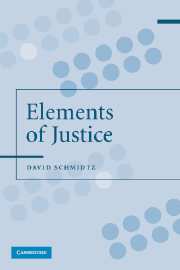Book contents
- Frontmatter
- Contents
- Acknowledgments
- PART 1 WHAT IS JUSTICE?
- 1 The Neighborhood of Justice
- 2 The Basic Concept
- 3 A Variety of Contestants
- 4 Contextual Functionalism
- 5 What Is Theory?
- PART 2 HOW TO DESERVE
- PART 3 HOW TO RECIPROCATE
- PART 4 EQUAL RESPECT AND EQUAL SHARES
- PART 5 MEDITATIONS ON NEED
- PART 6 THE RIGHT TO DISTRIBUTE
- References
- Index
5 - What Is Theory?
Published online by Cambridge University Press: 05 June 2012
- Frontmatter
- Contents
- Acknowledgments
- PART 1 WHAT IS JUSTICE?
- 1 The Neighborhood of Justice
- 2 The Basic Concept
- 3 A Variety of Contestants
- 4 Contextual Functionalism
- 5 What Is Theory?
- PART 2 HOW TO DESERVE
- PART 3 HOW TO RECIPROCATE
- PART 4 EQUAL RESPECT AND EQUAL SHARES
- PART 5 MEDITATIONS ON NEED
- PART 6 THE RIGHT TO DISTRIBUTE
- References
- Index
Summary
Thesis: Successful theories are maps, not attempts to specify necessary and sufficient conditions.
THEORIES ARE MAPS
Let us explore the idea that one way to see what a theory is, and what a theory can do, is to see a theory as a map. We begin with a terrain (a subject matter), and with questions about that terrain. Our questions spur us to build theories – maps of the terrain – that articulate and systematize our answers. To know how to reach Detroit, we need one kind of map. To know how to be a good person, we need another map. Note: Maps do not tell us where we want to go. Our questions predate our theorizing, and constitute our reasons to theorize in the first place.
Theories Are Abstractions
A map of Detroit is an artifact, an invention. So is a map of justice. In neither case does the terrain being mapped really look like that. A map of Detroit is stylized, abstract, and simplified. It otherwise would fail as a map. Yet a map can be accurate in the sense that it does not mislead. A given map will for some purposes have ample detail; for other purposes it will be oversimplified.
A map is not itself the reality. It is at best a serviceable representation. Moral theories likewise are more or less serviceable representations of a terrain. They cannot be more than that.
- Type
- Chapter
- Information
- The Elements of Justice , pp. 21 - 28Publisher: Cambridge University PressPrint publication year: 2006



